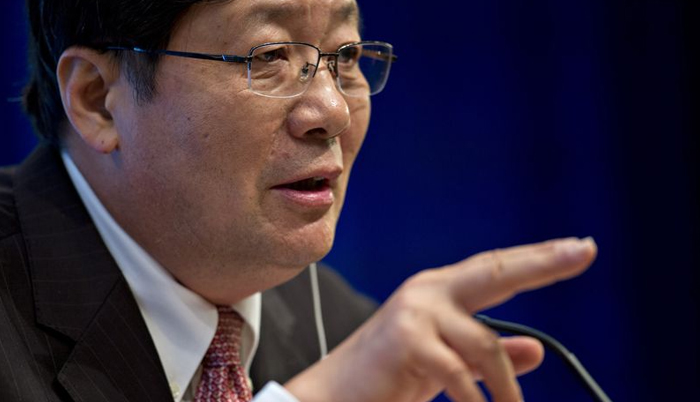![]() Home > World Business
Home > World Business
China Regulator Says Banks Will Go ‘All Out’ To Bolster Lending

Lou Jiwei in 2016.Photographer: Andrew Harrer/Bloomberg
![]() July 10th, 2022 | 14:29 PM |
July 10th, 2022 | 14:29 PM | ![]() 374 views
374 views
CHINA
An official at China’s banking and insurance regulator said authorities will use policy tools “flexibly and precisely” at proper times to stabilize the economy, while banks and insurers will “go all out” to bolster funding.
Authorities will support an “appropriate” acceleration in infrastructure investments as demand remains weak, and will broaden long-term fund-raising channels including private capital, said Liu Fushou, chief risk officer of the China Banking & Insurance Regulatory Commission.
Policy makers will also step up monitoring of debt default risks among large enterprises and seek to quicken the introduction of the nation’s financial stability law, he said at the Caixin Summer Summit in Beijing Saturday.
With China’s economy slowing due to pandemic lockdowns, a debate over economic stimulus took center stage at the annual conference of economists and policy makers. The Ministry of Finance is considering allowing local governments to sell 1.5 trillion yuan ($220 billion) of special bonds in the second half, an unprecedented acceleration of infrastructure funding aimed at shoring up the beleaguered economy.
Still, a former central banker told the forum that China should be cautious with cutting interest rates or lowering banks’ required cash reserves due to looming risks of importing inflation.
Monetary policy “should reserve enough room and be cautious with using large-scale price or quantity-based tools” in the second half, said Hu Xiaolian, former deputy governor of the People’s Bank of China. “China can’t have the kind of stagflation expectation that’s facing Western countries now.”
Inflation may transmit to China from overseas given that it’s a huge country that’s highly integrated with the global economy, Hu said. China needs to prevent self-reinforcing expectations of inflation and not flood the economy with stimulus, she said. Hu confirmed after her speech that she was referring to reductions in interest rates and the reserve requirement ratio of banks.
Hu’s comments echoed recent remarks by PBOC Governor Yi Gang, who cited the central bank’s heightened focus on inflation and suggested monetary stimulus should prioritize boosting credit over cutting interest rates. Consumer prices grew 2.5% last month, stronger than expected and the fastest in two years, as pork prices rebounded.
Price Constraints
Sheng Songcheng, former head of the PBOC’s statistics and analysis department, said prices shouldn’t be a huge constraint on fiscal and monetary policies as inflation is likely to remain below the official target of 3% this year. Such policies should remain accommodative as the economy is just recovering, he said at the forum.
Hu meanwhile urged the government to maintain a consistent policy stance on the property industry and local government debt. The market shouldn’t expect Beijing to go back to the old way of stimulating the sector for the sake of growth, or to relax the rules allowing local governments to add hidden debt, she said. Instead, the real estate industry will need to transform to a healthier growth model, while local governments can consider issuing more special bonds to fund its spending, she said.
China should clarify what practices are forbidden or encouraged in different sectors, referring to President Xi Jinping’s latest strategy of guiding the “healthy development of capital” and setting up a “traffic light” for capital, Hu said. A clear set of rules will help stabilize expectations and encourage businesses to expand investment, she said.
More Stimulus
Separately, a former top finance official signaled that China has room to widen its budget deficit to provide more support for small businesses battered by Covid outbreaks.
“The budget fiscal deficit of central and local governments can be increased when necessary,” Lou Jiwei, who served as finance minister from 2013 to 2016, told the conference. Aid for small firms “is still insufficient due to a severe slump in fiscal income across local governments,” he said.
The central government could boost transfer payments to regional authorities to help them support individual merchants and small and micro businesses, Lou said. Local governments meanwhile could invest more on public projects, he added.
Fiscal stimulus is seen playing a more important role in Chinese authorities’ policy mix this year as the local governments face slumping revenue and greater spending on Covid controls.
China’s other options to fund the increased spending include issuing special sovereign bonds and requiring state-owned enterprises or the central bank to transfer more profits, Citigroup Inc. economists said in a note Friday. The augmented fiscal deficit -- a broad measure that covers the 2.8% official budget deficit -- will likely increase by 3 percentage points to 14.3% of the economy this year from 2021, according to a forecast by Goldman Sachs Group Inc.
Among other speakers:
Chen Wenhui, vice chairman of the nation’s pension fund, said US-China tensions have slowed the flow of long-term capital into private Chinese companies, with US investors almost halting investments. He said valuation levels in the private equity market are also falling.
Source:
courtesy of BLOOMBERG
by Bloomberg News
If you have any stories or news that you would like to share with the global online community, please feel free to share it with us by contacting us directly at [email protected]